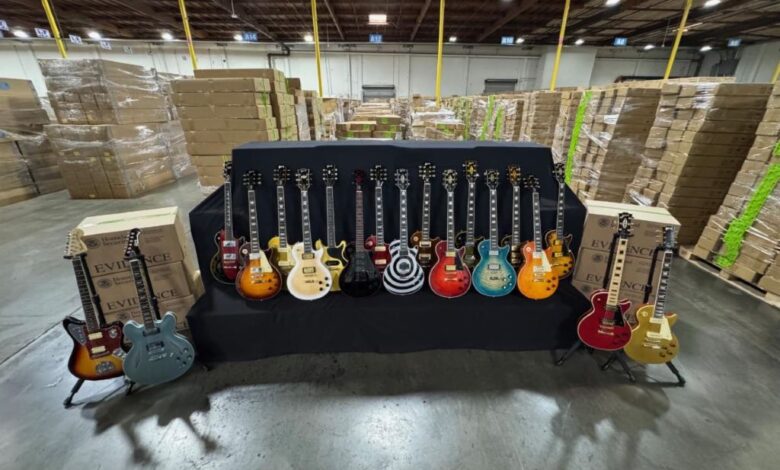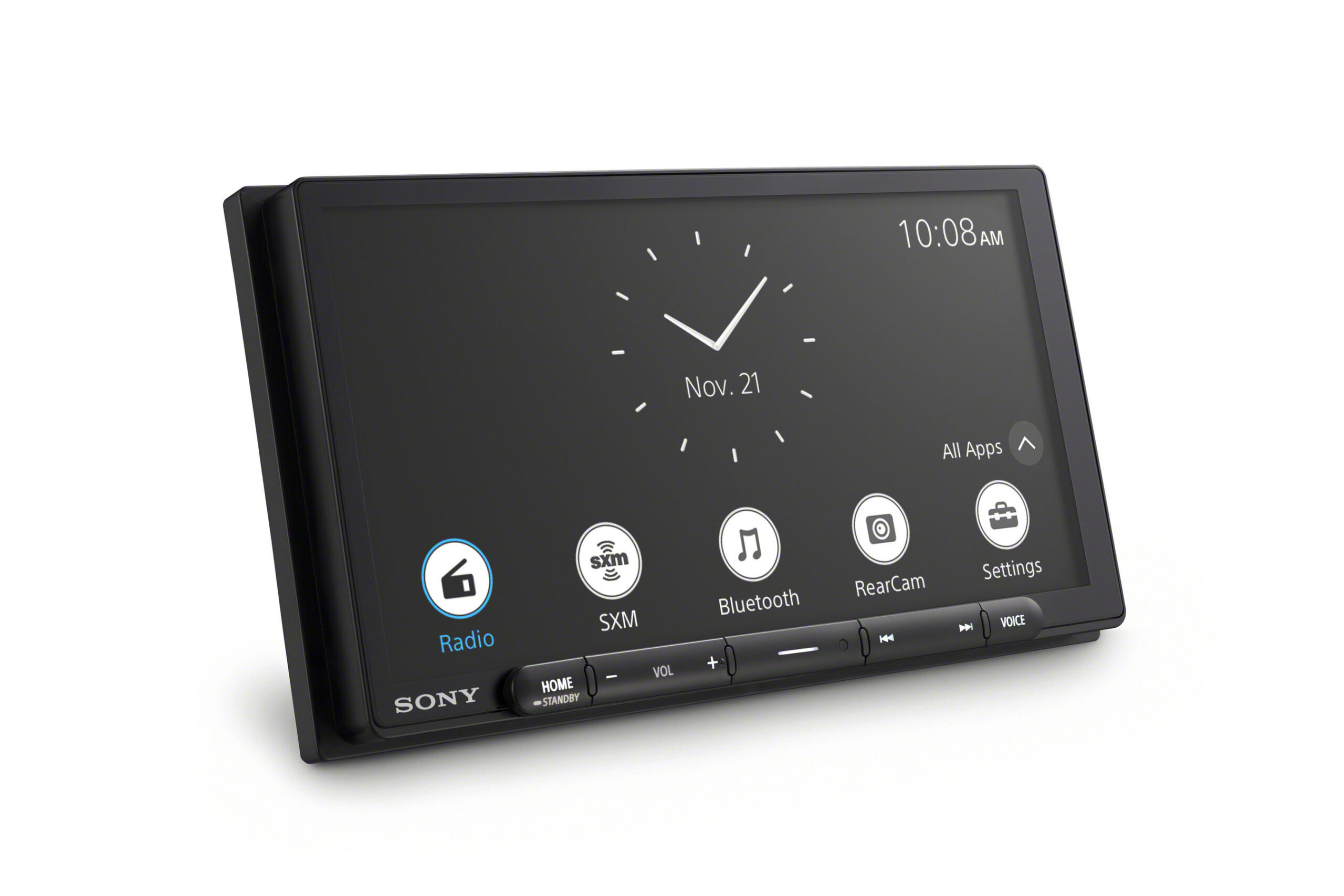U.S. Customs and Border Protection (CBP) officers and import specialists assigned to the Los Angeles/Long Beach Seaport, in conjunction with U.S. Homeland Security Investigations (HSI) special agents, Los Angeles County Sheriff’s Department (LASD) investigators, and Gibson officials, announced the seizure of over 3,000 counterfeit Gibson guitars with a manufacturer’s suggested retail price (MSRP), had they been genuine, of $18,742,820 (USD). CBP officers in coordination with HSI special agents and LASD investigators intercepted the suspected cargo arriving in ocean containers from Asia. CBP’s Consumer Products and Mass Merchandising Center of Excellence (CPMM) assisted in estimating the MSRP of the shipment. Gibson confirmed that the guitars intercepted were in fact counterfeit, noting that legitimate Gibson guitars are only Made in the U.S.A.
“These fraudulent guitars may look and feel legitimate for unsuspecting consumers buying them from third party online sources, street markets, unauthorized retailers, and person-to-person transactions,” said Cheryl M. Davies, CBP Director of Field Operations in Los Angeles. “As we approach the busy Holiday shopping season, consumers should pay attention to where they are buying these goods and how much they are paying, and if is too good to be true it probably is.”
“We are grateful for the hard work that our U.S. CBP officers, HSI special agents, and the Los Angeles County Sheriff’s Department investigators are doing to stop counterfeiting,” adds Cesar Gueikian, CEO of Gibson. “Our partnership is designed to help every agency work together to protect consumers and our fans from being misled into counterfeits. Today’s announcement gives us hope that we are on the right track, working together as partners. To our music lovers and customers, no matter which American brand you decide buy, always buy direct from the source, or from authorized dealers. Our pledge is to protect the consumer and give them the tools to make the journey of playing guitar and making music the most amazing experience.” “This is really emotional and personal for us not only because of the protection of our players, but because of our Gibson team at large, including the artisans at our craftories in Nashville, TN and Bozeman, MT, who are generations of American families that have dedicated their entire lives to handcrafting Gibson instruments,” adds Beth Heidt, Chief Marketing Officer at Gibson. “As Gibson celebrates its 130th anniversary this year, we are proud of our legacy of quality and craftsmanship, legendary music partnerships with our artists, and our efforts to promote and create more musicians that continue to shape the sounds of generations of musicians and music lovers across every genre.” For over 130 years, Gibson the iconic American instrument brand has been committed to producing instruments that meet the highest standards of quality and craftsmanship. All Gibson instruments are handcrafted in the USA at our craftories in Nashville, Tennessee, and in Bozeman, Montana. Safeguarding Gibson’s legacy and generations of unmatched craftsmanship is essential to preserving the value, authenticity, and unique sound that Gibson guitars are known for worldwide. These brand protection efforts also protect customers from the scam of counterfeit instruments, ensuring musicians can trust in the excellence and heritage that only a genuine Gibson can offer. Consumers are encouraged to avoid unauthorized sellers, as counterfeit instruments not only lack Gibson’s quality, and safety standards, but are also ineligible for warranty protections. This seizure underscores the importance of purchasing Gibson guitars exclusively from Gibson.com and/or Gibson’s many authorized dealers worldwide, ensuring buyers receive our genuine instruments backed by Gibson’s 130-year legacy and quality guarantee. “Intellectual property theft is not a victimless crime. Victims are American consumers, businesses, trademark holders and people who manufacture and sell legitimate products. Often, the illicit proceeds resulting from the sale of counterfeit or unlicensed products are funneled back to support a broad range of illegal activities,” said HSI Los Angeles Deputy Special Agent in Charge John Pasciucco. “Counterfeit products harm legitimate businesses, erode consumer trust, and damage the reputation of iconic brands like Gibson. Beyond the economic losses, counterfeit goods often do not meet safety or quality standards, leaving consumers at risk,” said Los Angeles County Sheriff’s Department Lieutenant William Kitchin. Counterfeit goods also threaten the health and safety of shoppers as they are often made of inferior materials, manufactured under uncontrolled and unsanitary conditions, and labeled with false information. “Counterfeit goods fund criminal enterprises that engage in forced labor, smuggling, drug trafficking, and other illicit activities,” says Africa R. Bell, CBP Port Director of the LA/Long Beach seaport. “Counterfeiters are only interested in making a profit – they do not care about you or your family’s well-being or the well-being of our economy.” Enforcement ApproachTo deter the importation of illicit goods and protect U.S. consumers and businesses, CBP has developed a proactive, aggressive, and dynamic enforcement approach to Intellectual Property Right (IPR) enforcement. Nationwide, in Fiscal Year 2023, CBP seized 19,724 shipments containing goods that violated Intellectual Property Rights (IPR), this equates to nearly 23 million counterfeit goods. The total manufacturer’s suggested retail price (MSRP) of the seized goods, had they been genuine, was over $2.7 billion (USD). Seizures of counterfeit goods from China and Hong Kong accounted for 46% of counterfeit seizures and 84% of the value of counterfeit seizures. Report FraudFor more information about the risks associated with purchasing counterfeit goods, visit CBP’s Fake Goods, Real Dangers website and read CBP’s e-Commerce Awareness Guide. Additional tips for protecting your family from counterfeit goods are available at StopFakes.gov. Rights holders wishing to protect their brand from infringing imports should record their trademarks and copyrights with CBP at https://iprr.cbp.gov/. Suspected intellectual property rights violations, fraud, or illegal trade activity can be reported by contacting CBP through the e-Allegations Online Trade Violations Reporting System or by calling 1-800-BE-ALERT. Violations can also be reported to the National Intellectual Property Rights Coordination Center at https://www.iprcenter.gov/referral/ or by telephone at 1-866-IPR-2060. |

 Above (L-R): Cheryl Davies (CBP Director of Field Operations in Los Angeles), John Pasciucco (Los Angeles Deputy Special Agent in Charge, HSI), William J. Kitchin ll (Lieutenant Los Angeles County Sheriff’s Department, LASD), Andrea Bates (Partner, Bates and Bates), Beth Heidt (Chief Marketing Officer, Gibson), Raeann Vinton (Cultural Influence at Gibson), Africa R. Bell (Port Director LA/Long Beach Seaport, CBP), and Angel Villagrana (CBP Customs Trade Officer).
Above (L-R): Cheryl Davies (CBP Director of Field Operations in Los Angeles), John Pasciucco (Los Angeles Deputy Special Agent in Charge, HSI), William J. Kitchin ll (Lieutenant Los Angeles County Sheriff’s Department, LASD), Andrea Bates (Partner, Bates and Bates), Beth Heidt (Chief Marketing Officer, Gibson), Raeann Vinton (Cultural Influence at Gibson), Africa R. Bell (Port Director LA/Long Beach Seaport, CBP), and Angel Villagrana (CBP Customs Trade Officer). Above: A Fender and a Gibson counterfeit guitar.
Above: A Fender and a Gibson counterfeit guitar. Above: More counterfeit guitars seized by U.S. Customs and Border Protection.
Above: More counterfeit guitars seized by U.S. Customs and Border Protection.







